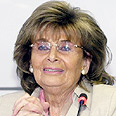
"PR". Charlotte Knobloch
צילום: איי פי
Criticism over Grass' late SS confession
President of the German Central Council of Jews says admission negated Grass' longtime criticisms of German politics and society for not adequately dealing with Nazi past. Others demand him to return his Nobel Prize
The head of Germany's main Jewish organization on Tuesday criticized novelist Guenter Grass for waiting decades to reveal that he had served during World War II in the Waffen-SS, the Nazis' dreaded paramilitary force.
Charlotte Knobloch, president of the Central Council of Jews, said the admission negated Grass' longtime criticisms of German politics and society for not adequately dealing with the Nazi past.
"His long years of silence over his own SS past reduce his earlier statements to absurdities," Knobloch was quoted as saying by the Netzeitung online newspaper.
Late admission
Grass has been widely criticized after his admission in an interview published Saturday in the Frankfurter Allgemeine Zeitung that he had served in the Waffen-SS. In the interview, he expressed shame at having been part of the organization and said he was making the admission because "It weighed on me."
Previously, it was only known that he worked as an assistant to anti-aircraft gunners - a common duty for teenagers at the time - and that he was wounded before being captured by U.S. Troops. Grass said he volunteered at age 15 for the submarine
service and was refused, only to be called up for military service at 17. When he reported for duty in Dresden, he found it was with the 10th SS Panzer Division
"Frundsberg."
He said that under the sway of Nazi indoctrination he did not view the Waffen-SS as something repulsive, but as an elite force.
PR measure
Knobloch pointed out that Grass has a memoir coming out on Sept. 1. The book details his SS experiences. "The fact that this late admission comes so shortly
before the publication of his new book raises the suspicion that this is a PR measure," She was quoted as saying.
Grass' critics have included Joachim Fest, a leading author on the Nazi period, and former Polish president Lech Walesa, who said Grass should give up his honorary
citizenship in his hometown of Gdansk, Poland. The city was called Danzig when Grass was born there in 1927.
A Forsa poll for Stern magazine showed 87 percent of those surveyed did not agree that Grass should give back his 1999 Nobel Prize for literature, as some critics have demanded. Eight percent said yes and five percent did not know in the survey of 1,005 people taken Monday. No margin of error was given.
Michael Sohlman, head of the Nobel Foundation in Stockholm, was quoted as saying by the Dagens Nyheter newspaper that the Nobel Prizes cannot be revoked. "The decisions are absolute and it has never happened that a prize has been revoked," Sohlman said.
Officials at the Swedish Academy, which awards the literature prize, declined to comment on the issue.










